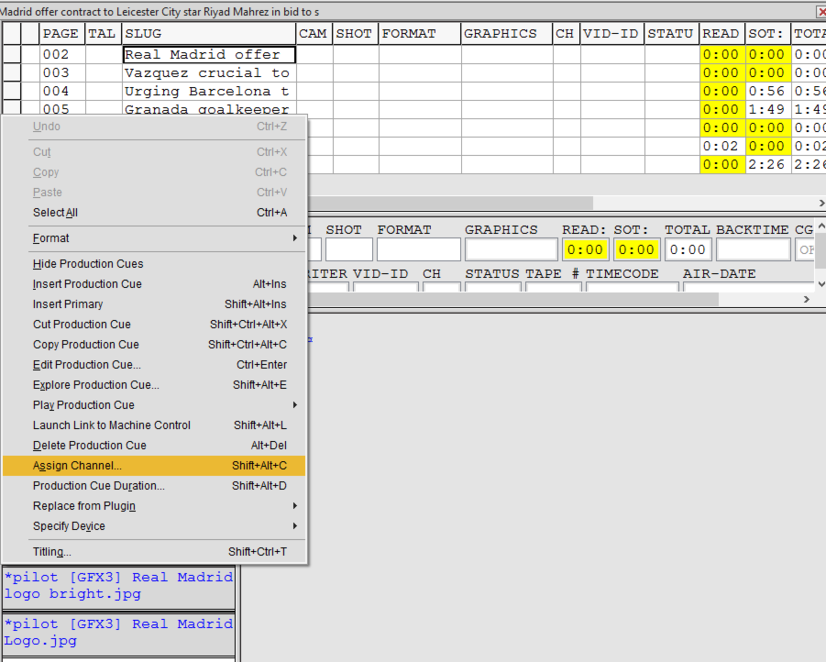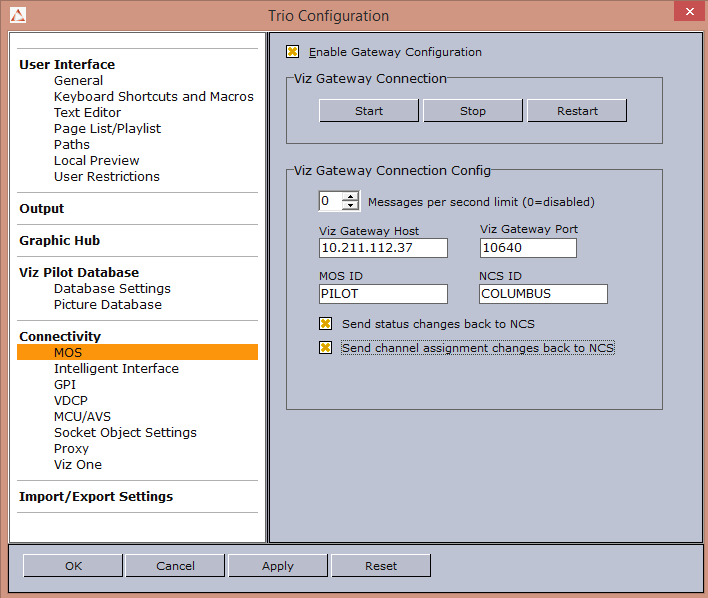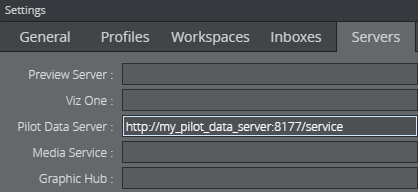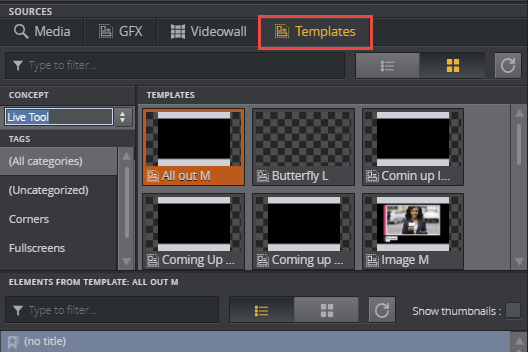
Viz Multiplay User Guide
Version 3.0 | Published October 23, 2020 ©
Working with Viz Pilot and MOS Content
This section covers integrating Viz Multiplay with Viz Pilot and MOS playlists. In addition, it deals with setting up a Pilot Data Server directly in Viz Multiplay.
The following topics are presented here:
Definitions
-
Internal playlists (show playlists): These playlists are owned by the show, exported together with the show, and deleted when removed from the show. Viz Multiplay automatically creates three internal playlists when creating a new show: Shortcuts (for often used presets), GFX (for source graphics) and Videowall (for source presets that can be dragged into the show or into shortcuts).
-
External playlists: These playlists are created by an external system such as Viz Pilot or a MOS playlist from a newsroom system. External playlists are not owned by the show and are only referred to from the show. External playlists have the same appearance as internal playlists, but will not be deleted when removed from the show.
To Add a Playlist
-
Click the Add (+) button to the right of the tabs in the Show pane. You can now choose between adding an internal or external playlist.
Viz Pilot Playlists
If you have already set up your Media Sequencer in a Viz Pilot workflow then you have likely also created one or more Viz Pilot playlists.
These can be added as external playlists to your show:
-
Click the Add (+) button to the right of the tabs in the Show pane.
-
Click Add external playlist.
-
Browse to the playlist you want to add and click OK.
Tip: Organize elements in shows and playlists in groups to ensure that they appear in Viz Multiplay.
Note: You cannot edit elements in this Viz Pilot playlists if Media Sequencer is set up with an Oracle connection to the Viz Pilot database. You must then use Viz Pilot to edit the elements.
Edit the Elements in a Viz Pilot Playlist
Right-click an element and select Edit if the Media Sequencer is set up to connect to a Pilot Data Server (which can be backed by either an Oracle database or a Viz Graphic Hub). The elements are then put back to the database through an HTTP connection to the Pilot Data Server. The Media Sequencer will detect this change and update the element in the Media Sequencer automatically.
The MOS Workflow
The Media Sequencer contains one or more MOS playlists if it's set up in a Newsroom workflow connected to a Viz Gateway. The Media Sequencer is responsible for communicating with the Newsroom system through the MOS protocol and keeping the MOS playlists up to date. Any changes are immediately reflected in Viz Multiplay.
MOS playlists can be added as external playlists to your show:
-
Click the Add (+) button to the right of the tabs in the Show pane.
-
Select Add external playlist.
-
Browse to the MOS playlist you want to add and click OK. Initially, the MOS playlist is empty. To request it from Viz Gateway, right-click the MOS status label and select Request.

The Media Sequencer now takes ownership of the MOS playlist and updates it live whenever the rundown changes.
Since MOS playlists are organized in stories (groups), the elements will be visible in Viz Multiplay. Each story becomes one group in Viz Multiplay. Clicking the group will expose the elements in the group, organized per channel. Elements in a MOS playlist are owned by the newsroom system, and can therefore not be edited. However, it is possible to drag elements from one channel to another channel.
Assigning a Channel
In Avid iNEWS, you can specify the playout channel by right-clicking the item in the story and selecting Assign Channel.

When Media Sequencer receives the MOS playlist, it sets the channel on the elements so Viz Multiplay can organize them under the correct channel in the GUI. This channel must exist in the active profile. Elements without a channel will appear under the channel set as the Program channel.
Write Channel to Newsroom System
If you drag a MOS element in Viz Multiplay to another channel, it's possible to write the new channel back to the newsroom system. This feature must be enabled in Viz Trio:

You can release the MOS playlist from the Media Sequencer by right-clicking the MOS status bar and selecting Release.
Caution: The Media Sequencer will stop updating the playlist for all clients connected to the Media Sequencer. Exercise caution when releasing a MOS playlist.
Pilot Data Server
If it's installed on your system, Viz Multiplay can connect to a Pilot Data Server and use the graphics directly without using an external Viz Pilot playlist.
To set up this workflow, both Viz Multiplay and Media Sequencer must be configured to use the same Pilot Data Server.
Configure Pilot Data Server in Viz Multiplay
-
Go to Settings > Servers.
-
Enter the URL or hostname to the Pilot Data Server in the Pilot Data Server input field.
Tip: Enter only the host name and press TAB - Viz Multiplay auto completes the full URL.

-
The Templates tab appears in the Sources pane once Viz Multiplay connects to the Pilot Data Server:

Tip: If the Templates tab does not appear after configuring the Pilot Data Server URL this likely indicates that the URL is unreachable. Type the URL in a browser to see if you can connect to a Pilot Data Server.
The Templates tab contains Viz Pilot concepts and templates. Drag a template over to the playlist area. Viz Multiplay will now create a new Viz Pilot database element and insert a reference to it in Media Sequencer. Media Sequencer is responsible for connecting to the Viz Pilot database and inserting the element into Media Sequencer so it can be played out. Media Sequencer also keeps the element up to date whenever a change is made to the database element.
Connect Pilot Data Server to Media Sequencer
-
In a browser, go to http://mse_host:8580/app/pilotdbconfig/pilotdbconfig.html.
-
Add the host and port to the Pilot Data Server in the config GUI.
Note: You may need to restart Media Sequencer.
When you edit the Viz Pilot elements in Viz Multiplay (right click and select Edit), the changes are sent directly to the Viz Pilot database through HTTP. Media Sequencer detects any changes and updates the element in Media Sequencer automatically.